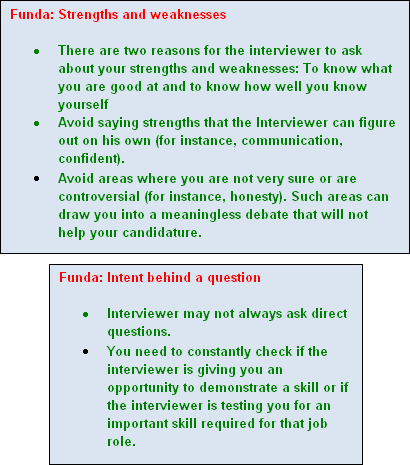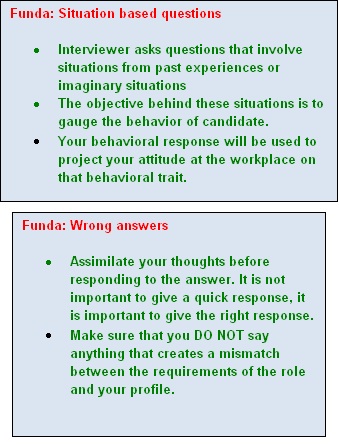
In the second part of the series (on mistakes that candidates make during an interview), Amit Bansal of PurpleLeap.com lists more such examples and advices aspiring candidate to avoid these pitfalls.
For the benefit of first time readers, let me introduce you to the two characters of this series. The first person is the Interviewer who is responsible for getting the right person for his organisation. The other character in this series is actually not just one person. This character is a job seeker who holds a professional degree and wants to get a job as soon as possible. Let's just call this person the Candidate.
In this series, I am going to share the experiences of the interviewer with various candidates. All these candidates belong to the category of zero to one-year work-experience. This series is aimed at giving you the Interviewer's perspective on the interview process. I will be taking out excerpts from actual interviews and then share the viewpoint of the interviewer. The Interviewer's comments will be interleaved in the interview itself.
In the first part, I discussed the following parameters:
Let's start with the second interview in this series.
Interview 2:
The position is business development executive for South ABC (say South Mumbai) city. The person will carry the responsibility of selling our company products to corporate clients. This involves cold calling and prospecting, meeting the client and eventually closing the sales.
The Candidate walks into the room. The candidate shakes hands and sits down. He hands over his resume.
Apart from the contact details and personal information, the resume briefly looks like this:
Education and credentials:
PGDM: Completed post graduate diploma in Management at XYZ Institute of Management, for the academic term 2007-2009 with 68 per cent
Completed BBA from LMN with 76 per cent in 2007
HSC: Completed XII in non-medical from CBSE Board with 69 per cent in 2004
SSC: Completed Class X from CBSE Board with 61.2 per cent in 2002
Soft skills: Basic computer knowledge, Microsoft Office (word, excel, power point)
Projects of graduation: A market research project on 'Potential of Eco-friendly Power in Mid-size companies'
Achievements:
Click on Next to read the Interviewer's comments.
The author is the CEO of PurpleLeap (https://www.purpleleap.com/) an employability skill enhancement initiative of Educomp Solutions Pvt Ltd.

The resume is giving me conflicting signs. This candidate has an average performance in Class X and XII. In graduation, however, he is the class topper and also a university rank holder. In his MBA, he is again demonstrating an average performance.
Under soft skills, the candidate is writing his knowledge of computers. The knowledge of computers/MS Office should have been mentioned either as technical skills or IT tools. Basic knowledge of computers and MS Office is a given trait and if this candidate is mentioning it separately, it gives me an impression that probably he does not have much to say about himself.
The candidate may have some achievement orientation as he has participated in a zonal level football tournament and was also selected for an exchange programme.
My first impression on the resume: He has an inconsistent performance record. However, he has demonstrated streaks of high performance and can be an asset if he displays such behaviour in this job as well.
Amit Bansal is the CEO of PurpleLeap (https://www.purpleleap.com/) an employability skill enhancement initiative of Educomp Solutions Pvt Ltd.

Interviewer: Vivek, can you please tell me something about yourself.
Candidate: Sir, my name is Vivek. I have completed my MBA from XYZ college. I am an excellent communicator and have a strong convincing power. That's the reason I feel that I can be a successful sales and marketing professional. I want to become a part of a fast growing organisation that provides me opportunities to grow.
Interviewer comments: A confident start indeed!
However, I did not find the candidate to be an excellent communicator. This candidate was average in communication. Maybe the candidate has an overrated view of his capabilities.
Interviewer: Vivek, I see that you have been an average student throughout but in graduation you have done quite well. How did that happen?
Candidate: Sir I really liked the subjects in BBA. I found the subjects interesting and hence could do really well in those subjects. In my MBA also, I did very well in the subjects related to sales and marketing. But other subjects like finance, organisational behaviour etc. did not interest me much. Hence my percentage was not that good in MBA.
Interviewer comments: This candidate can possibly do well in areas that hold his interest.
Interviewer: That's fine. Vivek, I have this bad habit of smoking. Do you think smoking is good or bad?
Candidate: Sir, it is a bad habit.
Interviewer: Can you help me get rid of this bad habit?
Candidate: Sir, how can I help you?
Interviewer: But you said that you have a strong convincing ability. Can you convince me that I should stop smoking.
Candidate: Sure Sir. Smoking is injurious to health. Smoking can harm people around you as well through passive smoking. Every time you smoke a cigarette, you are reducing your life by five minutes. Every year, so many people die because of smoking. Hence, you should stop smoking.
Interviewer: Vivek, I am fine if I live one year less but I want to enjoy my life till I die.
Candidate: Sir, but you are harming a lot of other people as well.
Interviewer: There are so many other things that harm other people. When you drive a motorcycle, the emissions from that pollutes the environment and that harms people. Will you stop driving your bike?
Candidate: No Sir.
Interviewer: Then why should I stop smoking because it harms other people?
Candidate: (silence)
Interviewer comments: Since the candidate had mentioned that he has a strong ability to convince, I provided an opportunity to the candidate to demonstrate the same. Firstly, the candidate did not understand that I was presenting a situation where he could use his convincing power. Secondly, when he started doing that, it was an average attempt. If someone is really good in persuasion, one will understand that convincing involves a dialogue and not a monologue or lecture.
Persuasion is a critical skill involved in selling; hence I was spending that extra time in figuring out the ability of this candidate on this skill parameter.
Amit Bansal is the CEO of PurpleLeap (https://www.purpleleap.com/) an employability skill enhancement initiative of Educomp Solutions Pvt Ltd.

Candidate: I was selected for the ABC zonal football team. I play at the position of centre forward. Out of 25 district teams with over 400 players, a team of 16 was chosen. I was one of them. I had applied for the same last year as well but could not get through. Then I practiced hard and got selected the next year.
Interviewer comments: I liked the go-getter attitude of this candidate. If he is determined to do something, he goes that extra mile to achieve that.
Interviewer: I will give you a situation. Assume that you are the captain of your football team. Every morning at 6 am, your entire team turns up for practice. However, your best player is not regular with the practice sessions. How will you handle this situation?
Candidate: I will give him a warning that if he does not come for the practice regularly, he will not be selected in the team.
Interviewer: But he is the best player in the side, he is the Pele of your team. There is no way you can win the tournament without him. And he also knows that.
Candidate: Sir, if he does not turn up for the practices regularly, I will not select him for the tournament. Even if it means that we lose the competition.
Interviewer comments: I gave a situation that involves people management. One of the most important aspects in managing business is that the business should not suffer. This candidate has given a solution that eventually makes the business suffer (he is willing to lose the competition). This indicates that the candidate may get into ego clashes and may not be able to manage the human resources.
Interviewer: Ok Vivek, tell me where do you see yourself in five years timeframe?
Candidate: Sir, I see myself leading a large team of sales and marketing people and managing a large region independently.
Interviewer: What is the part in sales that you do not like at all.
Candidate: Sir, I do not like cold calling. In my summer project, I did cold calling to get data for assessing the potential of eco-friendly power with mid-size companies. The project involved explaining the merits of solar power to be used for power backup instead of the traditional diesel generators. I had to get data from at least 25 companies in the three months timeframe. I finally got data from 30 companies but I did not like the process of making calls to unknown people and begging for an appointment. I liked the part of meeting the companies and explaining the product benefits.
Interviewer comments: The role requires a person to do lot of cold-calling and prospecting before eventually meeting up a client. The requirements of the role were detailed out to all prospective candidates. If the candidate hates cold-calling and prospecting, chances are very high that the candidate will get frustrated in the job leading to under-performance.
Interviewer: Thanks Vivek. Anything that you want to ask me?
Candidate: Sir, I can assure you that I will do well in this job as I am keen in making a career in sales and marketing.
Interviewer: Thanks Vivek. We will keep you posted.
Candidate: Thanks Sir.
Interviewer comments: I liked the candidate on the following parameters: achievement-orientation, enthusiasm and reasonably decent communication skills.
However, this candidate has lot of reds for this particular role.
Mismatch between the requirement of the role and the liking of the candidate. The role requires a strong cold-calling component and the candidate does not like that. Further, I can establish from the conversations that the candidate does not perform well when the field of work does not interest him. This presents a high degree of risk in hiring for this position.
The candidate seems to have an over-rated view of his capabilities. The candidate told me that he is really good in communication and persuasion. However, I did not find that to be true. That also presents a doubt in my mind over his other statements about himself. I will be a little cautious in giving him the benefit of doubt.
People management: Even though it is not a critical component of the job right now, this candidate may have problems managing people later.
Overall, he is a high-risk candidate for me. I will prefer to avoid this candidate than run into problems later.
Amit Bansal is the CEO of PurpleLeap (https://www.purpleleap.com/) an employability skill enhancement initiative of Educomp Solutions Pvt Ltd.